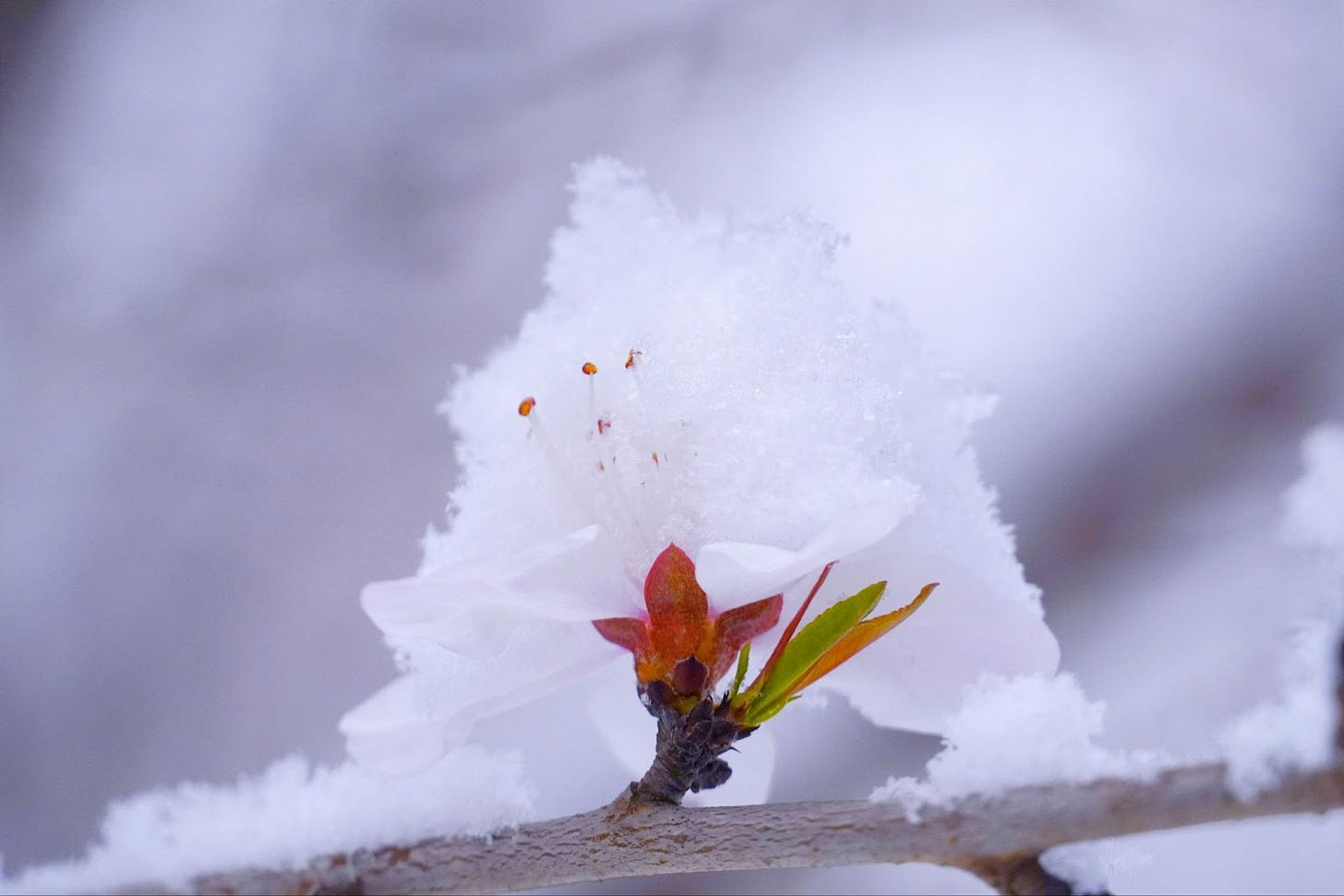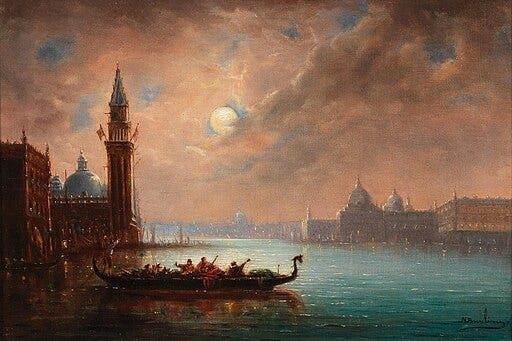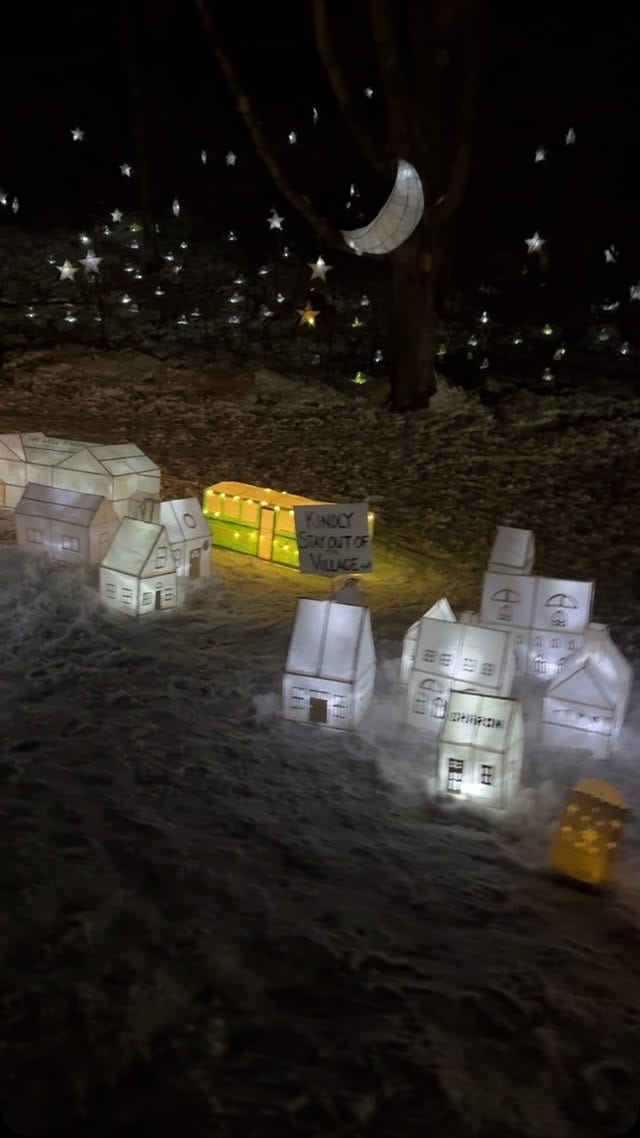Before we begin…
What’s the first book you picked up this year? How is it speaking to you?
Welcome! You’ve reached Spark. Learn more here or just read on. If you see something you like, please hit that heart so others can find us more easily. And if this email is truncated in your inbox, just click the headline above to come on through and read everything all at once.
Gratitude Department
Thank you to two subscribers who became paid subscribers over the holiday break. An added thrill: each happens to be writers I admire here on this platform. Thank you to
and for your support! I urge you to check out Jolene’s work at Time Travel Kitchen and Mary’s at Mary’s Pocketful of Prose.A journey I wasn’t expecting
Last week, for reasons I’m just beginning to understand, I reached for Salley Vicker’s debut novel, Miss Garnet’s Angel, a book I first read when it first came out nearly 25 years ago. It’s a deceptively simple story about a British spinster who leaves her home in Ealing for Venice, Italy. She arrives there on January 1 and spends the next six months learning just how little she understands about herself, other people, or life itself.
Julia Garnet’s journey is triggered by the death of Harriet Joseph, her friend and flat-mate of thirty years, two days after each retired from their careers as teachers. Although Julia herself does not permit herself to think too deeply about the impulse for this trip, the very first lines of the novel lay it out.
“Death is outside life but it alters it: it leaves a hole in the fabric of things which those who are left try to repair. Perhaps it is because of this we are minded to feast at funerals and it is said that certain children are conceived on the eve of a departure, lest the separation of the partners be permanent. When in ancient stories heroes die, the first thing their comrades do, having made due observances to the gods, is sit and eat. Then they travel on, challenging, with their frail vitality, the large enigma of non-being.” - Salley Vickers, Miss Garnet’s Angel,
The idea is not new, but I kept reading because of the last line and, particularly, the words, “frail vitality.” These two words captured the dominant sensation I feel as I contemplate the uncertainties of the coming year and whatever lies ahead. The novel is about uncertainty that follows when someone we love dies, illness strikes, or other events outside our control strip us of the protective cuticle that has formed over the years. We come to understand we are not who we thought we were. We come to understand that nothing is certain and to try to make them so is nothing but a display of fear.
I write “we” but, of course, I am talking about, and to, myself. Which is why I kept reading even though the story was not as I remembered it. When I went searching for it on my shelves last week, I was spurred by a memory of its setting, Venice, and the idea that a lonely single woman, a virgin, “way past childbearing age” who hadn’t experienced much of life, could change. I remembered something about a lover, a landlady that initiated her into the mysteries of living in and getting around Venice, and a bit of humor. I was looking for a breather between Dickens novels.
I found, instead, a story that, more than once, took my breath away. I want to be clear: this is not my favorite book of all time. A parallel story within the novel, involving a legend associated with the archangel Raphael, proved distracting and felt forced at times, even though Julia’s path towards growth relies on what the story teaches her. The humor I recalled and was touted in some of the blurbs on the front of my copy flashes here and there, mostly early on when Vickers shows us a tweed-coated, self-conscious Julia confronted by the swarming crowds, confounding system of navigation, and opulent beauty of Venice.
I was riveted, however, by Julia’s internal journey. She understands so little about herself and, in Venice, begins to realize that this is because she has been afraid so much of her life and, also, like many if not most humans, tends to “shy away from self-scrutiny.” She does fall in love but the relationship ends suddenly after she discovers a humiliating truth about the man, leaving her in a kind of pain she has never known and, yet, reveals her to herself.
“..she had loved Harriet, she now knew, and she knew it because she had learned to love someone else…If you spend most of your life alone often you do not know that you are lonely. It was not until “the discovery” that Julia Garnet knew she was lonely and had been so for most of her life.” — Salley Vickers, Miss Garnet’s Angel
As she makes her way forward, I found myself underlining sentences that seemed to be waiting for me to find them.
“...there existed in life two kinds of people: those who tangled with their fate, who took issue with what life brought them, who made, in short, waves, and those who bore their circumstance, taking life’s meaning from what came to them, rather than what they wrested from it.” - Salley Vickers, Miss Garnet’s Angel
“The trick was to assume that all life’s experiences were somehow necessary.” - Salley Vickers, Miss Garnet’s Angel
But perhaps the moment that most resonated came in the closing paragraphs of Chapter Five as she thinks of Harriet and wonders why she is able to see her friend more clearly now.
“Wasn’t it queer that you could get to know a person better when they were dead than when they were alive? Perhaps it was because the dead could not reprove you? It was fear that made one hold back from knowing people.”— Salley Vickers, Miss Garnet’s Angel
As she walks on, she thinks of a centuries-old story she has learned about a chapel in Venice, a young suitor and a virgin “trapped in her high rooms, clinging to her virginity, unaware that passion awaited her in the person of the young merchant who had sailed across the seas from the Levant.” The virgin is shielded from shame, pain, loss, hurt and the decisions one must face if one is living life.
“We are all closed in and the key is turned on our uncertainty, tolled a voice in her mind, as she threaded her way down the Calle Lunga.” —Salley Vickers, Miss Garnet’s Angel
I put the book down and teared up.
I remember now that when I first read this novel I felt traces of impatience with Julia. I kept waiting for something more to happen to her. I was in my forties then, a year away from marrying for the second time, a year and a half away from moving across the country to start what I thought of as a “new” life. I wasn’t certain how any of it would go and I admit to being afraid from time to time. Yet I was also thrilled. I felt a kind of vitality that was anything but frail. I was able to tap into the eighteen-year-old me who leapt into motherhood with a kind of trust in herself and the future that had little basis in reality. As most of us do, I viewed the world - and Julia- through the lens of my own experience and expectations.
Back then, I was often blinded to my own hubris. I saw myself as resilient and competent. When a new experience left me with new insights, I was all too quick to share them with others whether they asked for them or not. I told myself I was helping when, all too often, I was judging or getting in the way.
This has been, I believe, my way of dealing with uncertainty. Keep moving. Keep fixing. My life may have included more change and many more people than Julia’s did but, like her, I’ve always resisted the kind of self-scrutiny that might challenge my view of my strengths and weaknesses. More accurately, I have glimpsed the quaking, sad, uncertain being inside me, and have turned away from her, concealed her as best I can beneath a persona that is only partly me.
It’s not so easy any more. Is it because I’m twenty-five years older? Is it the accumulation of losses over the years and the knowledge of more to come? All I really know is that I am certain of nothing right now, not even myself. Especially myself. My streams of energy, optimism, and confidence ebb and flow, often in a trickle. My desire to help people I love is ever-present but so is the knowledge that there is little I can do to solve much of what they face. I am aware of my limits. Increasingly, I am aware of questions rather than answers. Talking about change unsettles me. On the plus side: the urge to judge is diminishing; the urge to listen is stronger. Acknowledging my weakness and limits still causes acute discomfort but I’ve begun to understand more deeply that if I cling to who I thought I was, I won’t be able to embrace the life that I have.
I am more like Julia than not, these days. Which could be why this little book spoke to me now in a way it did not when I first picked it up twenty-five years ago. The biggest thing that ever happens to a human being happens in this book. In what turns out to be the last year of her life, Julia Garnet opens up to strangers, to beauty, to love, to pain, to loss, to joy, to herself, and to questions she will never be able to answer. Life was not over for her yet. So she decided to live.
More from Salley Vickers
If you’ve not read Salley Vickers and want to sample her writing, here are some of her short stories.
If you like what you see or it resonates with you, please take a minute to click the heart ❤️ below - it helps more folks to find us!
Thoughts for the New Year

“He allowed himself to be swayed by his conviction that human beings are not born once and for all on the day their mothers give birth to them, but that life obliges them over and over again to give birth to themselves.” ― Gabriel García Márquez, Love in the Time of Cholera
“The only thing that makes life possible is permanent, intolerable uncertainty: not knowing what comes next.” ― Ursula K. Le Guin, The Left Hand of Darkness
Bedtime (or anytime) stories
My sister told me about Book at Bedtime, the reading series from BBC’s Radio 4 but I’d never listened to it. I was checking it out when I came across the perfect starting point: short stories read aloud courtesy of the BBC.
Author events and sources for your next read
If you’ve read Viet Thanh Nguyen’s novel The Sympathizer – or even if you haven’t – you might enjoy the online interview and discussion coming up on January 16 courtesy of the California Book Club. This novel, better than many, illustrates that there are rarely two sides to any human or any question humans tackle. The discussion sounds like it will be a good one. Note: recent events scheduled online by the book club were canceled due to the fires here in CA so go ahead and register but be prepared to be flexible. Registration is free. Click here to register.
Welcome New Subscribers!
If you’ve just subscribed, thank you so much for being here. If you would like to check out past issues, here’s a quick link to the archives. Be sure to check out our Resources for Readers and Writers too where you will find links for readers, book clubs, writers, and writing groups. And if you’d like to browse for your next read, don’t forget to check out books by authors in our community at the Spark Author Page. If you are a published author, we’d love to share you and your work. Click here for more info. Another great source: the many wonderful reviews you’ll find among the #Bookstackers.
The more the merrier! Please share with your friends and invite them to join us!
Ways to show you like what’s happening here
We don’t do paywalls but we do work hard so if you’d like to show your support for Spark, here are some ways to do that:
Consider a paid subscription ($5/month or $35/year) or use this as a link that will allow single contributions of any amount via PayPal.
There will be no paywalls. All subscribers will still have access to every post, archives, comments section, etc. If finances are an issue (and when are they not?), you can still show your support for Spark by participating in our conversations, “liking” a post by hitting that heart, and by sharing Spark among your friends. All of these things help bring new subscribers into the fold and every time we expand our audience, the conversation grows and deepens. Click below for more info.
Let me know how you are and what you’re reading. If there’s an idea, book, or question you’d like to see in an upcoming issue of Spark, let us know! Use the comment button below or just hit reply to this email and send your message directly.
And remember, If you like what you see or it resonates with you, please take a minute to click the heart ❤️ below - it helps more folks to find us!
Ciao for now!
Gratefully yours,
Betsy
P.S. And now, your moment of Zen…our towns
When winter brings darkness and cold, there is a way to bring light. That’s what this charming video from subscriber Terry R. offers. If you are a fan of Thornton Wilder’s Our Town, you’ll especially appreciate this. It’s a project from the children of the Connecticut Valley Towns which includes Peterborough, the setting for the play. We talked about Our Town in December of 2023.
Calling for Your Contribution to “Moment of Zen”:
What is YOUR moment of Zen? Send me your photos, a video, a drawing, a song, a poem, or anything with a visual that moved you, thrilled you, calmed you. Or just cracked you up. This feature is wide open for your own personal interpretation.
Come on, go through your photos, your memories or just keep your eyes and ears to the ground and then share. Send your photos/links, etc. to me by replying to this email or simply by sending to: elizabethmarro@substack.com. The main guidelines are probably already obvious: don’t hurt anyone -- don’t send anything that violates the privacy of someone you love or even someone you hate, don’t send anything divisive, or aimed at disparaging others. Our Zen moments are to help us connect, to bond, to learn, to wonder, to share -- to escape the world for a little bit and return refreshed.
I can’t wait to see what you send!
And remember, if you like what you see or it resonates with you, please share Spark with a friend and take a minute to click the heart ❤️ below - it helps more folks to find us!






Teary reading your beautiful, open, vulnerable words, Betsy. What a journey we all are on, eh? …. Looking deeply and deeper can be so painful and scary at times but ultimately I do believe that courageous path — no matter how many twists and turns it takes - is more enriching for one’s soul. 💜
Thanks so much for the shout out! This is a beautiful post that resonates for me in many ways. I’m also rereading which is not something I usually do and I’m trying to release judgement and lean into curiosity instead.